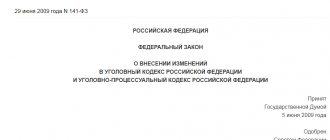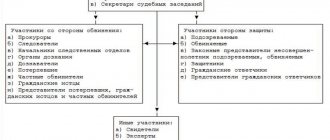This procedure is one of the main components of the investigative process. By filing charges, a person suspected of committing any wrongdoing can find out exactly what they are accused of.
Only by having information about a specific article of accusation can you build a defense and attract lawyers to your side. They will help you competently defend your rights and, if necessary, choose the best line of defense.
Do you want to figure it out, but don’t have time to read the article? Lawyers will help
Entrust the task to professionals. Lawyers will complete the order at the cost you specify
27 lawyers on RTIGER.com can help with this issue
Solve the issue >
Article 172 of the Code of Criminal Procedure of the Russian Federation. Procedure for bringing charges (current version)
1. The term “charge” in the first part of the commented article means a decision to bring a person as an accused as a written expression of the accusation.
2. If a defense attorney has not previously participated in the case, then before bringing charges against the accused, his right to the assistance of a defense attorney is explained and ensured. See comment. to Art. 50.
3. According to the literal interpretation of parts 2 - 4 of the commented article, the accused is not simply summoned, but is notified of the day of arraignment. This means: a) calling in advance so that the accused can prepare, including receiving the assistance of a defense lawyer; b) the need to notify the accused even when he is not summoned anywhere. For example, an accused person held in a pre-trial detention center must be notified in advance of the day on which he will be charged in the same pre-trial detention center.
4. Charges are brought after 3 days, also if the accused or his defense attorney fails to appear; the impossibility of calling the accused if his whereabouts are unknown; short-term illness of the accused; placing the accused in a psychiatric hospital for a forensic psychiatric examination (Part 3 of Article 203); natural disaster, etc.
5. If the decision to bring the accused as an accused remains not presented to the accused, then the case cannot be sent to court, and if the specified violation is revealed in the trial, the defendant, in our opinion, is subject to acquittal under paragraph 2 of part 2 of Art. 302 (non-involvement in the commission of a crime) due to the lack of proof of his guilt in the manner prescribed by law (Part 1 of Article 14). It is more difficult to resolve the issue of the legal consequences of the investigator missing the 3-day deadline for filing charges from the date of the decision to charge the person as an accused (in the absence of the circumstances specified in the previous paragraph of this commentary). It seems that if the specified period is violated slightly (within a few days), then the procedural consequences of such a violation, if the investigator is guilty, may be his removal from further conduct of the case (clause 6, part 1, article 39 of the Code of Criminal Procedure) and/or application to investigator of disciplinary measures. However, when the established deadline is violated significantly (for example, a decision to charge a person as an accused was presented to him only along with the materials of the completed investigation) or the accused was kept in custody at that time, there is a significant violation of the accused’s right to defense and the case must be returned by the prosecutor to the investigator for conducting an additional investigation (clause 2, part 1, article 221) starting from the moment the accusation was filed. At the same time, the results of all investigative actions that were previously carried out with the participation of such an “accused” must be declared unacceptable (parts 2, 3 of Article 88). The issuance of a new (but identical to the first) decision to bring the defendant as an accused in such cases is unlawful (has no legal force), because according to Part 1 of Art. 175 it can be accepted only if there are grounds for changing the previously brought charges.
Comment source:
Ed. A.V. Smirnova “COMMENTARY ON THE CRIMINAL PROCEDURE CODE OF THE RUSSIAN FEDERATION” (ARTICLE BY ARTICLE), 5th edition
SMIRNOV A.V., KALINOVSKY K.B., 2009
WHAT SHOULD BE THE EXPLANATION OF THE CHARGES?
An explanation to the accused of the substance of the charge brought, the essence of which intersects with paragraph 1 of Part 4 of Art. 47 of the Code of Criminal Procedure of the Russian Federation, is expressed in the fact that the investigator in understandable terms and in a language that is easier to understand must explain to the accused the legal and factual aspects of the accusation itself.
What does this mean?
First: the investigator, using the information obtained about the entire set of established factual data (the circumstances of what happened), must explain to the accused the content of the accusation, namely, when, where and what specific actions (inaction) the latter committed and why the investigative authorities believe that such actions are criminal, and what exactly was the criminality of the actions (inactions).
Next, the investigator must determine the scope of the charge against the accused.
In addition, he must explain what kind of harm, to whom exactly and to what extent was caused as a result of such actions of the accused and that such harm was caused precisely through the fault of the accused (intentional or careless).
Second: the content of the specific circumstances of the crime committed must be presented by the investigator in such a way that it is consistent with the disposition of the relevant norm of the criminal law, that is, the content of the accusation itself must characterize the legal characteristics of a specific crime.
In this regard, the investigator must explain to the accused why his actions (inaction) are qualified under one or another article of the criminal law.
Accordingly, the operative part of the resolution must indicate under which article (item, part) of the Criminal Code of the Russian Federation the person is being charged as an accused.
The investigator's decision on the qualification of the actions of the accused must contain a legal assessment of the act committed by the accused, according to which the investigator must substantiate his conclusion about the application of a specific criminal law norm in the case and convey it to the consciousness of the accused.
At the same time, the investigator cannot limit himself to just one reference to the operative part of the resolution. The law obliges the investigator, when bringing charges, to explain to the accused the legal terms used in the resolution, as well as to acquaint the person with the exact text of the article of the criminal law, explaining and disclosing all the signs of the disposition itself. And in the event that the disposition of a criminal law norm is reference, the investigator is obliged to explain to the accused the provisions of this normative act and its application in the qualification of a criminal case.
It is in this interweaving of legal and factual aspects that the essence of the accusation is formed, which must be explained to the person brought in as the accused.
Process specifics
Amendments and additions to the charges can be carried out in two directions. The first is the adjustment of the actual part (volume) of the accusation. At the same time, the criminal legal assessment (qualification) of the offense remains the same.
For example, the conclusion about the place and time of the event is changed, additional actions of the person (episodes) are included, the initial data about the criminal is corrected, etc.
In such situations, the severity of the assault may increase or remain the same. However, in this case, in essence, a new charge appears, and the person to whom it is brought must be given the opportunity to defend against it.
A change in fact is allowed only within the spatio-temporal boundaries of the events in connection with which proceedings were opened and criminal prosecution was carried out.
The concept, grounds and meaning of bringing a person as an accused
Involving a person as an accused is one of the central stages of the preliminary investigation stage, during which specially authorized officials perform a wide range of procedural actions provided for by law. The law does not contain the concept of bringing a person as an accused, but only regulates the grounds and procedural procedure for its implementation.
Within the meaning of the theory of criminal proceedings, bringing a person as an accused is identical to bringing a person to criminal responsibility. It is from this moment that the accused has the obligation to bear responsibility for his actions within the framework of the charges brought against him.
Involvement in criminal liability must be considered as the implementation of criminal procedural relations, but cannot be directly associated with the onset of criminal liability (implementation of criminal legal relations). Involvement in criminal liability during a preliminary investigation does not always entail criminal liability under a court verdict that has entered into legal force. For example, a criminal case or criminal prosecution may be terminated on one of the grounds provided for in Art. 24, 27 of the Code of Criminal Procedure of the Russian Federation, or the subject of criminal procedural legal relations may not coincide with the subject of the crime (in case of illegal or unfounded initiation of a criminal case and (or) criminal prosecution and criminal liability). In such cases, criminal prosecution will not entail consequences for the accused associated with the onset of criminal liability.
Therefore, it is necessary to distinguish between theoretical concepts such as criminal prosecution and criminal liability; the accused (subject of criminal procedural relations) and the criminal (subject of criminal legal relations).
The Code of Criminal Procedure contains an independent chapter 23, which regulates the prosecution and filing of charges.
By bringing a person as an accused (to criminal liability), the investigator thereby establishes that it was this particular subject who committed the crime, and raises the question of solving the crime.
Involvement as an accused as the central stage of the preliminary investigation stage can be defined as a set of actions of a specially authorized official aimed at solving a crime and directly related to the decision to bring a person to criminal responsibility, made on the basis and in strict accordance with the law.
When carrying out an investigation in the form of a preliminary investigation, bringing a person as an accused includes:
- issuing a decision to bring him or her as an accused;
- presentation of this resolution to the person brought as an accused (indictment);
- interrogation of the accused on the merits of the charge brought;
- amendment and addition of charges.
The first three procedural actions are mandatory and in accordance with Art. 171, 172 and 173 of the Code of Criminal Procedure of the Russian Federation follow strictly one after another.
The fourth stage is optional. The need for its implementation arises in accordance with Art. 175 of the Code of Criminal Procedure of the Russian Federation only if there are grounds to change the charge.
During an investigation in the form of an inquiry, bringing a person as an accused in accordance with Art. 225 of the Code of Criminal Procedure of the Russian Federation is carried out by drawing up an indictment. In exceptional cases, when a preventive measure in the form of detention was chosen against the suspect, and the indictment was not drawn up within 10 days from the date the suspect was taken into custody, prosecution as an accused is carried out according to the rules provided for the preliminary investigation (Art. 224 of the Code of Criminal Procedure of the Russian Federation), after which the inquiry continues in the manner established by Chapter 32 of the Code of Criminal Procedure of the Russian Federation, or this preventive measure is cancelled. When conducting an inquiry in an abbreviated form, a person is brought in as an accused by drawing up an indictment.
Within the meaning of Art. 171 of the Code of Criminal Procedure of the Russian Federation, it is permissible to bring a person as an accused only if there is sufficient evidence giving grounds to accuse the person of committing a crime. It is obvious that the adoption of this decision is preceded by the criminal procedural activities of the investigator established by law, aimed at collecting evidence confirming the involvement of a specific person in the commission of a crime. Sufficiency of evidence means:
a) the presence of a body of evidence; b) the possibility of checking them; c) confirmation by this evidence of the circumstances included in the subject of proof (for example, the presence of a crime event, the commission of an act by a specific person, the qualifications of the act).
The conclusion about the sufficiency of evidence is made by an official of the preliminary investigation authorities, that is, this is the subjective opinion of the investigator. When assessing evidence, it is necessary to be guided not only by the provisions of the Criminal Procedure Code of the Russian Federation (Articles 14, 17, 24, 25, 27, 28, 73-90), but also by the norms of criminal law (disposition of the article of the special part of the Criminal Code, statute of limitations, age of the person, brought in as an accused). In the process of further investigation, the accusation may be clarified, amended and supplemented (Article 175 of the Code of Criminal Procedure of the Russian Federation). When bringing forward the initial accusation, one can neglect to establish the circumstances that contributed to the commission of the crime, mitigating or aggravating the punishment, and fully characterizing the personality of the accused. It should be noted that the Code of Criminal Procedure of the Russian Federation has made an attempt to specify as much as possible the list of circumstances that must be proven and confirmed by the materials of the criminal case at the time of deciding the issue of bringing a person as an accused.
The decision to charge a person as an accused must be timely and correct.
The legality and validity of the decision made depends on the activities of the investigator. Late or premature imposition of a person as an accused can lead to negative consequences. Errors and miscalculations made in practice lead to gross violations of the law associated with causing moral and material damage to innocent people. The law guarantees a citizen the right to compensation for moral and material damage, restoration of labor, pension, housing and other rights (Chapter 18 of the Criminal Procedure Code of the Russian Federation), and also provides for criminal liability of officials for bringing a knowingly innocent person as an accused (Article 299 of the Criminal Code of the Russian Federation) . In addition, by virtue of Article 75 of the Code of Criminal Procedure of the Russian Federation, evidence obtained in violation of the requirements of the law is inadmissible, has no legal force and cannot be used as the basis for an accusation, or used to prove any of the circumstances relevant to the case.
At the same time, it should be emphasized that the damage caused to a citizen by the groundless prosecution of him as an accused is always incomparably greater than the compensation guaranteed by the state. At the same time, the actual criminal remains unpunished and often commits new crimes without hindrance, the investigation goes along the wrong path, and lost time and the associated consequences lead him to a dead end and the crime remains unsolved.
The significance of this stage of the preliminary investigation is determined by several circumstances:
1. When brought as an accused, a person acquires a new procedural status. In the process, the central participant in the criminal process appears - the accused.
2. From this moment, fundamentally different criminal procedural relations arise between the accused, the preliminary investigation authorities, the prosecutor and the court.
3. The accused acquires the rights necessary to defend against the charges brought against him, giving rise to the corresponding duties of the investigator.
4. The testimony given by the accused constitutes new independent evidence.
5. The investigator has the right to protect the investigation from negative influence from the accused by choosing a preventive measure against him.
6. In accordance with Art. 252 of the Code of Criminal Procedure of the Russian Federation, trial is carried out only in relation to the accused and only on the charge brought against him. Changing the charge in court proceedings is possible only if this does not worsen the situation of the defendant and does not violate his right to defense.
Amendment and addition of charges in criminal proceedings
The consolidation of this procedure in the Code is determined by the need to ensure the implementation of the right of the accused to defense. Article 175 regulates the procedure for changing and supplementing the charges before transferring the case to the prosecutor for approval of the indictment. After this, different rules will apply.
The general meaning of the procedure for changing and supplementing charges is the opportunity to improve the citizen’s situation. In other words, a person's liability may be mitigated.
To change and supplement the charges, the prosecutor may return the materials to the investigator. If the case has already been transferred to the court, the qualification of the act cannot be changed in the direction of toughening the punishment.
Adjustment of legal assessment
It assumes:
- Reclassification of the act. For example, instead of theft, a citizen is charged with robbery.
- Changes in individual qualifying characteristics. For example, instead of threatening to use violence when committing extortion, a person is charged with threatening to damage/destruct property.
- Adding additional compositions to the qualification in aggregate. This may be due to both a change in the factual side and the criminal legal assessment of previous circumstances.
Improving the subject's position
A change or addition to the charge may be in favor of the person. This is due to:
- The disappearance of an independent whole accusation.
- By changing qualifications by excluding references to one or another article or by reclassifying them to the norm of a less serious attack.
- The disappearance of episodes (one or more) of a continuing crime.
- Changing the amount of damage resulting from the act towards a decrease.
Specifics of the charge
It may contain signs of the composition of one act, qualified under one norm of the Criminal Code, or an ideal combination of several elements provided for by the relevant articles of the Code. Its factual basis is always formed by a single type of act, a single event. This provision applies to cases where, for its legal assessment, it is necessary to refer not to one, but to several norms of the Code.
All other types of multiple assaults (their actual totality, provided for in Part 1 of Article 17) require the filing of several charges. For example, if a citizen at different times participated in theft and hooliganism, he is charged with two acts, respectively. If it is determined that the subject committed robbery, rape and murder, 3 crimes will be charged.






